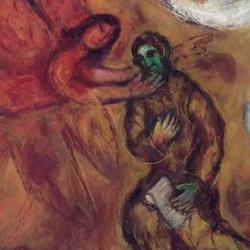Isaiah 66:6 would make a neat movie scene. First we hear a voice of tumult, a voice like the roaring of the sea or like the din of a gigantic party. It’s coming from the city, but the camera keeps moving to focus on the temple (heykal, “palace,” used of Yahweh’s temple-palace), which is where the sound is coming from. But then the camera moves into the temple and we realize that the din we’ve heard is the voice of Yahweh Himself, the sevenfold voice that breaks cedars (cf. Psalm 29). And the temple is made of cedar.
Three times the verse uses the word qol, “voice.” The first two times, the voice is qualified by its location – from the city, from the temple. The last time, it is qualified by the speaker: The voice of tumult and confusion, it turns out, is the voice of Yahweh, tumult in Person because He is the eternal Voice.
Isaiah has a lot to say about tumult (sha’on). Initially, it is the voice of Jerusalem’s celebrations (Isaiah 5:14) but then it becomes the sound of the roaring sea of Gentiles that will overwhelm Judah and Jerusalem (17:12-13). Ultimately, the source of the din is unveiled: It is Yahweh Himself who makes a sound like the roaring of the sea, a voice like the sound of many waters.
In 66:6, the voice is the voice of payday. Yahweh is dealing out wages to His enemies, settling accounts, balancing the books. It’s the voice of the Lord who shows up in the garden in the Spirit of day to confront Adam (Genesis 3:8, the first biblical reference to the qol YHWH). He is doing shalam, paying wages to His enemies to bring shalom.














